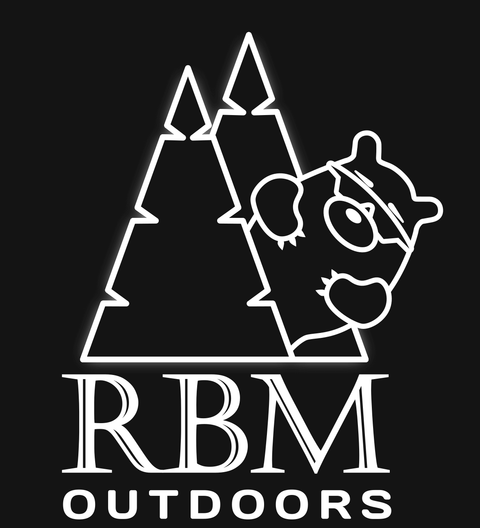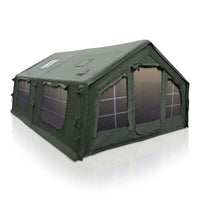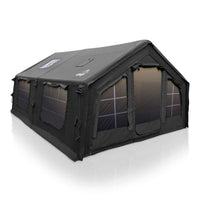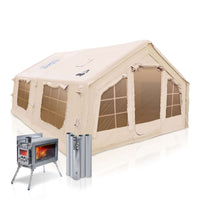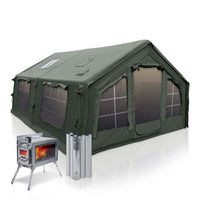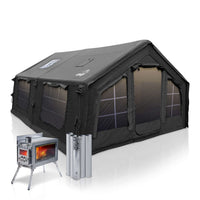Coody 17.2 | RBM Outdoors (Koala 7) Beige + Stove Caminus M - Inflatable Tents for Camping with Stove
Precautions raw: "Winter Camping Checklist for Coody | RBM Outdors Air Tents
1. Heating & Insulation
Use a tent stove via the stove jack or a safe electric heater. Never use open flames.
Maintain good ventilation to prevent carbon monoxide buildup.
Keep TPU panels closed to retain heat; unzip to cool down.
Use the curtain divider (if included) to block drafts and keep the sleeping area warm.
Insulate the tent floor with a mat or rug. Add a ground tarp for extra moisture protection.
For long trips, consider setting up a rain fly above the tent to protect from snow or rain.
2. Air Pressure in Cold Weather
Cold temps reduce air pressure in tent poles—check and top up as needed.
Make sure all air valves are tightly closed after inflation.
3. Condensation & Moisture Control
Keep vents slightly open to reduce condensation.
Avoid sudden heating against cold surfaces—adjust temp gradually.
Place a plastic sheet or insulated mat under your sleeping area to block moisture from the ground. Tents with Oxford floors (Coody Hub, Dome, 10.0) need this extra layer — it helps prevent damp spots and keeps heat in. PVC-floor models are naturally waterproof and don’t require it.
Dry the tent thoroughly before packing. Brush off snow or frost gently.
4. Weather Protection
Use a rain fly in snow — it’s made of slippery Oxford fabric, so snow slides off instead of melting into the tent.
If buildup starts, tap the roof lightly to shake it off.
If zippers freeze, warm them with hands or water—don’t force them.
5. Packing & Storage
Be aware - in freezing temps, PVC floors and tent fabric get stiff and hard to fold.
Use an electric pump to deflate air poles fully before packing.
Dry the tent in a well-ventilated space and store only when fully moisture-free.
6. General Winter Tips
Pitch on dry, elevated ground—avoid snow-laden trees.
Pack warm layers, sleeping bags, and heat-reflective gear.
Set up camp before dark to avoid cold-related issues."
Precautions value: "Winter Camping Checklist for Coody | RBM Outdors Air Tents
1. Heating & Insulation
Use a tent stove via the stove jack or a safe electric heater. Never use open flames.
Maintain good ventilation to prevent carbon monoxide buildup.
Keep TPU panels closed to retain heat; unzip to cool down.
Use the curtain divider (if included) to block drafts and keep the sleeping area warm.
Insulate the tent floor with a mat or rug. Add a ground tarp for extra moisture protection.
For long trips, consider setting up a rain fly above the tent to protect from snow or rain.
2. Air Pressure in Cold Weather
Cold temps reduce air pressure in tent poles—check and top up as needed.
Make sure all air valves are tightly closed after inflation.
3. Condensation & Moisture Control
Keep vents slightly open to reduce condensation.
Avoid sudden heating against cold surfaces—adjust temp gradually.
Place a plastic sheet or insulated mat under your sleeping area to block moisture from the ground. Tents with Oxford floors (Coody Hub, Dome, 10.0) need this extra layer — it helps prevent damp spots and keeps heat in. PVC-floor models are naturally waterproof and don’t require it.
Dry the tent thoroughly before packing. Brush off snow or frost gently.
4. Weather Protection
Use a rain fly in snow — it’s made of slippery Oxford fabric, so snow slides off instead of melting into the tent.
If buildup starts, tap the roof lightly to shake it off.
If zippers freeze, warm them with hands or water—don’t force them.
5. Packing & Storage
Be aware - in freezing temps, PVC floors and tent fabric get stiff and hard to fold.
Use an electric pump to deflate air poles fully before packing.
Dry the tent in a well-ventilated space and store only when fully moisture-free.
6. General Winter Tips
Pitch on dry, elevated ground—avoid snow-laden trees.
Pack warm layers, sleeping bags, and heat-reflective gear.
Set up camp before dark to avoid cold-related issues."
Dimensions:
Width - 3,60 m (141.73")
Length - 4,80 m (188.98")
Height - 2,20 m (86.61")
Ceiling height - 2,10 m (82.68")
Internal usable area - 17,2 m2 (185.14 sq. foot)
Net weight - 66,00 kg (145.00 lb)
Gross weight - 72,50 kg (159.00 lb)
FAQ
🏕 Who will enjoy this tent model the most?
Premium Inflatable Tent "Koala Air Tent 7" is a spacious and cozy tent, which is perfect for camping with your family. So, if you are planning a family camping trip, then Premium Inflatable Tent "Koala Air Tent 7" is definitely the right choice for you.
📦 Is there any ventilation inside the tent?
Premium Inflatable Tent "Koala Air Tent 7" is equipped with five-layer windows, which can be used for additional ventilation. However, if you want to make sure that the tent is thoroughly ventilated, you can always check out our camping fan. It is a great accessory that will help you maintain even temperatures inside the tent.
💡 How can you transport Premium Inflatable Tent "Koala Air Tent 7"?
Premium Inflatable Tent "Koala Air Tent 7" is a great choice if you travel by car. However, if you want to install it in a more remote area, you’d need an ATV or snowmobile.
Dimension packaging:
Box 1
Width - 0,87 m (34.25")
Length - 0,64 m (25.20")
Height - 0,50 m (19.69")
Weight - 56,00 kg / 123.46 lb
Box 2
Width - 0,60 m (23.62")
Length - 0,32 m (12.60")
Height - 0,23 m (9.06")
Weight - 16,50 kg / 36.38 lb
Inflatable Tent - 1 piece
Hand pump - 1 piece
Rain fly - 1 piece
Transparent TPU Windows - 4 pieces
Transparent Front plastic wall/Canvas - 1 piece
Ropes - 1 set
Ground nails - 1 set
Storage bag - 2 pieces
Winter Camping Checklist for Coody | RBM Outdors Air Tents
1. Heating & Insulation
Use a tent stove via the stove jack or a safe electric heater. Never use open flames.
Maintain good ventilation to prevent carbon monoxide buildup.
Keep TPU panels closed to retain heat; unzip to cool down.
Use the curtain divider (if included) to block drafts and keep the sleeping area warm.
Insulate the tent floor with a mat or rug. Add a ground tarp for extra moisture protection.
For long trips, consider setting up a rain fly above the tent to protect from snow or rain.
2. Air Pressure in Cold Weather
Cold temps reduce air pressure in tent poles—check and top up as needed.
Make sure all air valves are tightly closed after inflation.
3. Condensation & Moisture Control
Keep vents slightly open to reduce condensation.
Avoid sudden heating against cold surfaces—adjust temp gradually.
Place a plastic sheet or insulated mat under your sleeping area to block moisture from the ground. Tents with Oxford floors (Coody Hub, Dome, 10.0) need this extra layer — it helps prevent damp spots and keeps heat in. PVC-floor models are naturally waterproof and don’t require it.
Dry the tent thoroughly before packing. Brush off snow or frost gently.
4. Weather Protection
Use a rain fly in snow — it’s made of slippery Oxford fabric, so snow slides off instead of melting into the tent.
If buildup starts, tap the roof lightly to shake it off.
If zippers freeze, warm them with hands or water—don’t force them.
5. Packing & Storage
Be aware - in freezing temps, PVC floors and tent fabric get stiff and hard to fold.
Use an electric pump to deflate air poles fully before packing.
Dry the tent in a well-ventilated space and store only when fully moisture-free.
6. General Winter Tips
Pitch on dry, elevated ground—avoid snow-laden trees.
Pack warm layers, sleeping bags, and heat-reflective gear.
Set up camp before dark to avoid cold-related issues.
